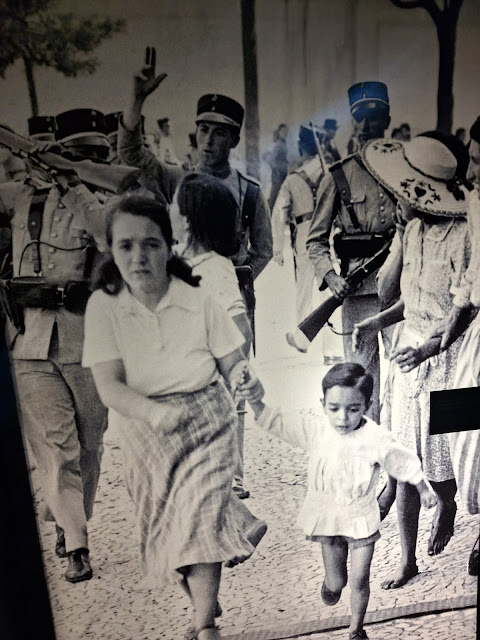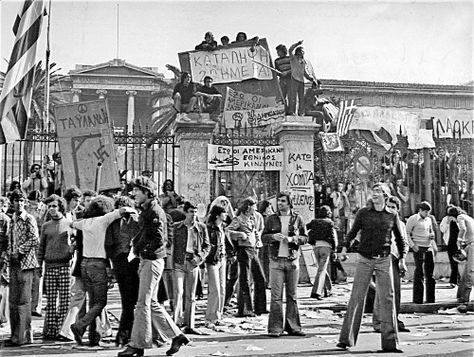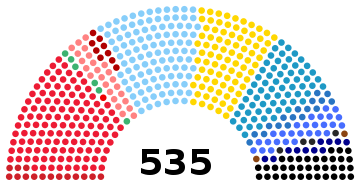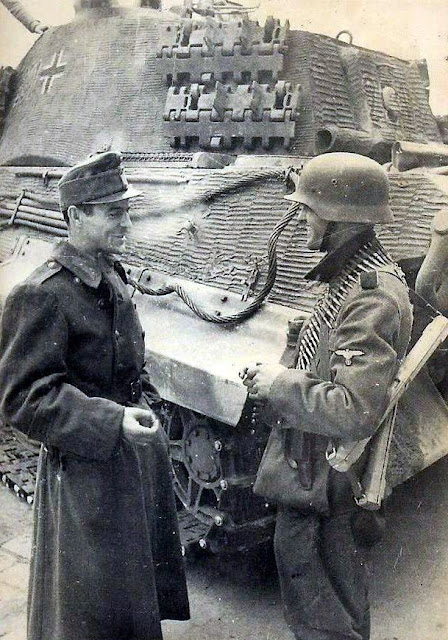 |
| You can tell a meme is worn out when the jpeg gets blurry |
It's election time in the United States, this means that many people are understandably worried about the results. Unfortunately, this means that a tired historical myth about elections and fascism. The argument goes something like "fascists come to power due to apathy". With the implication being that we must hold our noses and quash our principles and rally around a compromise administration and candidate.
On paper this seems perfectly logical, the snag is that it simply isn't true, Fascism doesn't bother with electoral niceties when it comes to the struggle for power. And today I will demonstrate this fallacy with a quick history lesson.
“A massive resistance not having been possible in 1933, the best of those at the heart of the
workers movement had to disperse their forces in a guerrilla war without hope. But if,
from this painful experience, the workers movement, the workers will draw from this
the lesson that only united defence at the right moment is effective in the struggle
against fascism, those sacrifices will not have been in vain”. FAUD member Ernest Binder in 1946
Prologue: Fiume 1919
We start our history of Fascism with an Italian despot, just not the one you're thinking of. General Gabriel D'Annunzio dictator of the free city of Fiume. After the First World War the map of Europe was redrawn. Part of that redrawing involved Italy giving up control of the city of Fiume to the new Kingdom of Yugoslavia. Incensed by this, the former socialist now ultranationalist D'Annunzio called out his troops and attempted to force the annexation of Fiume to Italy.
Italy refused to take Fiume back which left D'Annunzio in an awkward position, so he tried to turn lemons in lemonade by building an independent regime where he was. He instituted the first program for a Corporatist state, which was heavily copied by the Italian fascist movement. He also popularised the black shirts for political thugs and the act of torture by force-feeding of castor oil, which in some cases doubled as a form of execution. The Fascist* petty republic was defeated in 1920 by the Italian military after D'Annunzio's attempts to spread his vision through war failed to take off.
 |
| D'Annunzio with his voting block |
1922: Italy
"Our program is simple, we want to rule Italy" Benito Mussolini
The blackshirts march on Rome, they meet very little resistance from the Italian authorities, the governing coalition of liberal and conservative parties collapses and King Emmanuel III offers Mussolini the position of Prime Minister, which he accepts. There had been a general election in Italy one year earlier in 1921, the Fascists won just two seats with less than half a percent of the votes cast.
Mussolini got to work cementing his rule with the active collaboration of politicians from several conservative and liberal parties, so cosy were Mussolini's relations with the bourgeois political establishment that on the 31st of December 1924 his own Black Shirt officers threatened to remove him if he did not step up the pace of dictatorship, by 1925 all parliamentary pretences were gone. His regime is regarded in popular culture as a joke due to its incompetence and poor war time record, but Giacomo Matteotti wasn't laughing when Mussolini had him murdered for publishing proof of Fascist corruption and brutality, nor were the people of Ethiopia when his planes sprayed poison gas or when Italian colonists murdered tens of thousands. Fascist Italy also operated concentration camps in which thousands perished.
 |
| Italian soldiers posing during the burning of a village in Croatia 1941 |
1923: Spain
General Rivera and King Alonso XIII I accepted the military dictatorship because Spain and the Army wanted it to put an end to anarchy, debauchery and the surrendering weakness of political men. I accepted it as Italy had to embrace fascism Because communism was its immediate threat. And because of energetic therapy had to be used against the malignant tumors that we suffered in the Peninsula and in Africa.
King Alonso XIII interview with the Daily Mail 1924
General Primo de Rivera with the support of the King and the army establishment topples a liberal cabinet and rules as dictator until 1930. Rivera attempted to establish a Corporatist state in Spain and improved relations with Mussolini. In 1925, he established a Civilian Directorate, a sort of parliament which included direct representation for Spanish business interests he also collaborated with the Catholic Church on programs for patriotic and "correct" ideas amongst the population.
Oh, and he also cracked down on the usual suspects, Spain's minorities, people who spoke Basque or Catalan, the Anarchists in the CNT etc. Not the Spanish Socialist party though, their leadership collaborated with Rivera and were represented in his officially approved Cortes (parliament) and Largo Caballero was made Minister of State for Labour.
The repression and declining economy lead to growing opposition and a fracturing of Rivera's support base, in 1930 the King was forced to sack him, too late to save himself he too was soon looking for another job as Spain's second Republic was established.
1926 Portugal
'I consider more urgent the creation of elites than the necessity to teach people how to read.
Antonio Salazar
 |
| Portuguese fascist troops attacking the wives and children of striking workers |
In 1926 the Republic of Portugal was overthrown by a coalition of army officers, the Junta wasn't particularly stable and rearranged itself several times, eventually it rallied round Antonio Salazar who christened the Estado Novo (New State) a fascist regime that ducked out of the Second World War and limped on until 1974 when another uprising of the military toppled in what is known to history as the Carnation Revolution.
Salazar was yet another Corporatist Fascist, and his regime was as brutal as it was corrupt. He wisely collaborated with the Allied Powers in World II as his government was dependent on trade with the United States of America, this good favour would pay off heavily in the Cold War.
"Every four years, Premier António de Oliveira Salazar preserves Portugal's image as a democracy by blowing the dust off a few selected "opposition" leaders and relaxing police controls just enough for a few weeks to permit them to run for Portugal's 130-seat National Assembly. There are a few cracks in the facade. The assembly functions only as a rubber stamp. The opposition candidates are usually feeble old men left over from a regime that was discredited and overthrown four decades ago, and Salazar decides what they can and cannot talk about" - Portugal Against the Situation Time Magazine 1965
1933 Germany
As previously discussed, contrary to popular folklore Hitler was appointed Chancellor in 1933 by Hindenburg who was caving to pressure from his own coalition of support, an alliance of Conservative power brokers, industrialists and army officers. Hitler's first cabinet was dominated by these people, with only a handful of positions for his fellow party comrades. Despite that, the Nazi party was able to integrate its paramilitary the SA with the police nationally and carry out campaigns of active repression within several German states, including Prussia, the largest state in the Republic. This prevented the elections of 1933 being considered free and fair (see photograph) and gave Hitler the access to power that he needed to usurp his coalition partners and build a full-fledged dictatorship that ruled by decree, first using constitutionally guaranteed emergency powers and then getting rid of all pretence.
I don't think I need to explain the many atrocities of Nazi Germany here, so for brevity I'll just add that in March 1932 Germany held presidential elections, Hitler came second losing out to Hindenburg, who was supported by several parties including the SPD on an anti Hitler platform. Less than a year later in January 1933 appointed Hitler Chancellor of Germany. The state and government are not empty vessels waiting to be filled.
1936 Spain
We're back in Spain, after the Spanish right failed to beat the left electorally in July 1936 the Army rebelled against the government. When the workers also rose up to meet that threat, the coup turned into a civil war. This time the coalition of Catholic fanatics, aristocratic landowners and military officers were joined by the explicitly fascist Falange party. The coalition of the far right was supported by Hitler, Mussolini and Salazar, in the early days of the conflict the army rebels had no access to ports and relied on Portugal as its main supply route.
Alas, as we all know and lament, they were victorious and the regime of Francisco Franco brutalised Spain into the 1970s. Another victory for bullets over ballots.
1939 Slovakia
In the aftermath of the Munich agreement and German occupation of Prague, Hitler decided to create a client regime in Slovakia. Bishop Tiso was appointed with German backing the head of a new administration for a new state the Slovak Republic, this regime collaborated entirely with the Axis, including the invasion of Poland and the Soviet Union and the Holocaust. 60,000 Slovak Jews were deported after being beaten, humiliated and robbed by the Fascist Hlinka guard to give just one example of the fruits of this relationship.
The regime would die in 1944-5 under the twin blows of the advancing Soviet Army and the Slovak National Uprising.
1940 France
 |
| Laval was a key backer of Petain and the collaborationist position. Cartoon printed in 1942 in the Chicago Tribune |
After the routing of the French army Field Marshal Petain signed an armistice given over the North of France including Paris to German occupation. Oddly the southern part of the country and Algeria and its colonial positions** were allowed to remain quasi independent, in the vacuum of power Petain drew to his side representatives from the various factions of the French Far right including Action Francaise. This collaborationist regime became known as Vichy France, named after the town in which its motley crew of reactionaries set up their government in.
The collaborationist government carried out its own political and social counter revolution, assisted Hitler in his wars with other countries, especially in the East where French regiments took part in the invasion of the Soviet Union and the SS formed the Charlemagne division mostly staffed with French volunteers. Vichy also deported tens of thousands of Jews to their deaths. In 1944 when the German army was expelled from France Vichy collapsed and De Gaulle became the leader of a liberated France. The last Vichy holdouts were defeated in 1945.
 |
| Petain and Hitler meet in October 1940 and formally agree to collaborate with each other on many matters |
1941 Croatia
In 1941 the Kingdom of Yugoslavia was invaded by a mostly German army and occupied and broken up by most of the European Axis powers. Germany, Italy, Hungary and Bulgaria were all given territory to annexe and occupy. Parts of Croatia were given over to the Fascist Ustasha movement though with German and Italian support, they also had to accept an Italian royal as their King and formal head of state.
Like their Slovak counterparts, the Ustasha were enthusiastic proponents of their benefactors policies. Vicious campaigns of mass murder against Jews and Serbs were common and crackdowns on suspected partisans saw entire towns and villages destroyed. Despite this campaign of violence resistance continued and the regime collapsed once the German and Italian armies withdrew from the Balkans.
1944 Hungary
The Kingdom of Hungary under the dictatorship of Admiral Horthy was an early member of the Axis and ally of Nazi Germany. Horthy's regime was brutal and reactionary but it kept its local Fascist movement the Arrow Cross Party as a junior partner in its system. That chaged in 1944, the war was going terribly for the Axis powers but especially so for Hungary, the Soviet Army occupied much of the east and the frontline was approaching the capitol city Budapest. Horthy who had joined the Axis to enlarge his Kingdom not shrink it decided to cut his losses and appealed for a separate peace with the Allied powers.
Hitler didn't take break ups well. Instead of withdrawing from Hungary his forces launched what's called a coup de main, which essential a coup from without. Horthy's administration was overthrown and Frenec Szalasi and the Arrow Cross party in there place as loyal stooges to keep Hungary or what was left of it in the fight. This action kept Hungary which was essentially the city of Budapest and the lands around it west of the Soviet advance in the war for 163 days, 102 of which were occupied by the siege of Budapest, ensuring thousands more Hungarians were killed. The new regime also found time to end resistence to the state persecution of its Jewish population as the previous administration bloody as it was had been sceptical of genocide.
In the end Budapest fell, the German army was encircled and the Szalasi and his cronies were hanged.
1967 Greece
 |
| Student protestors at Athens Polytechnic |
When we think of Fascism in popular culture its relegated to the 1930s and WWII movies. Franco and Salazar are viewed as political dead ends hanging from a cliff awaiting their inevitable fall. Unfortunately this is not true, and Greece gives us a clear example of this. In 1967 a group of army officers with the support of the King seized power. Many of these men had the rank of Colonel and so their conquest is known as the Colonel's Coup and their dictatorship as the regime of the Colonels.
The relationship between the Fascist officers and the Monarchy quickly soured with the latter trying and failing to launch a coup of his own in December 1967. Thousands were arrested and many were tortured under suspicion of being "Anarcho-Communists". Despite the repression and reluctance by the international order to pressure the new regime too much over its strategic value the Junta failed to push the population into obedience. In 1973 students at Athens Polytechinic (pictured) rose up against the dictatorship. The Colonels responded with the full force of their arsenals, but despite killing 24 people failed to break the rebellion which continued to spread. The regime collapsed soon after in 1974 with its last actions enabling the Turkish occupation of Northern Cyprus and bringing Greece to the edge of war with Turkey.
1973 Chile
After surviving the Tanquetazo (Day of the Tank), a revolt by a tank regiment and the Fascist fringe group Patria y Libertad, Allende's government was overthrown by another much larger military revolt in that same year. The more revolt on the 11th of September rallied around Augusto Pinochet whom Allende had trusted with ensuring such a military revolt could not happen.
In addition to the insult there were plenty of injuries, thousands disappeared, football stadiums turned into concentration camps, torture and humiliation, assassinations. Pincohet's inclusion in a list of Fascist gets some pushback in certain corners. Some point to his embrace of the neo-liberal economics of Milton Friedman and his students in Chicago as a disqualifying factor, this ignores both the extensive bailouts of the Chilean economy and ownership of industry by the military and the major role and input of private business within the "classical" fascist regimes of Mussolini's Italy and Hitler's Germany.
It is a fact that the Nazi government sold off public ownership in several
state-owned firms in the mid-1930s. These firms belonged to a wide range of
sectors; for example, steel, mining, banking, shipyard, ship-lines, and railways. It
must be pointed out that, whereas modern privatization has run parallel to liber-
alization policies, in Nazi Germany privatization was applied within a framework
of increasing state control of the whole economy through regulation and political
interference. - Against the Mainstream: Nazi Privatisation in 1930s Germany
It also overlooks the active collaboration by overt Chilean and international fascist groups with the regime. In the fallout of the Tanquetazo's failure Patria y Libertad went underground and officially disbanded after Pincohet's Coup. Most of their members resurfaced within Pinochet's military intelligence units and death squads. And the ailing Franco was an early international supporter of Pinochet's new government, Pinochet returned the favour by being the only foreign leader to attend Franco's funeral in 1975.
Appendix One: An Exception?
 |
| "I too am a Fascist" pro-Fascist anti-Dolfuss cartoon |
Austria 1930s
For the sake of clarity I've outlined the main body of this article chronologically, in the spirit of conciliation I have given space to what some could consider an example of the electoral rise of fascism. I personally don't consider the following case an example of fascism being voted into power but we'll get to that.
I'm speaking of an Austrian who became Chancellor of a right wing coalition who took advantage of a crisis to become dictator. I am of course referring to Englebert Dolfuss. Dolfuss became Chancellor of Austria in 1932 running a coalition of right wing parties which managed to hold majority of one vote. So, while that's not that impressive he was a fascist with an electoral mandate right? Well, not really no. He was a reactionary nationalist as were most of the politicians in his political coalition but he didn't stand as an overt Fascist on a "give me supreme power for life!" ticket.
Dolfuss the Chancellor became Dolfuss the dictator in 1933 during a constitutional crisis in which the Austrian parliament nullified itself. During that crisis in stepped into the political vacuum with a new political vehicle the Fatherland Front. Dolfuss used an obscure emergency law to justify his rule by decree which was backed up by the army and police who arrested parliamentarians who insisted on trying to run a parliamentary republic. He outlawed all other political groups including the Social Democrats and Austria's Nazi party, the former would be defeated in a three day civil war that they try to ignore until most of their fighters were in prison and the latter launched a slightly more sucessful uprising that failed to put them in power but did suceed in killing Dolfuss.
Dolfuss styled his new movement the Austro-Fascist movement and attempted to build a corporatist state inspired by Mussolini's Italy who was Dolfuss's main international backer. After the demise of Dolfuss the Austrofascists stumbled on until 1938 when Hitler send troops over the border, the regime collapsed with littel opposition and after the Anschluss and the annexation of Austria into Germany was complete most members defected to the Nazis. It would not end well for them, Vienna was split into multiple occupation zones like Berlin until 1955.
Conclusion
This concludes a short summary of the rise of Fascism throughout history. The point is to bust the myth of fascism coming to power through the ballot box, but why is that myth worth busting? I don't wish to present representative democracy as some effective tool for rational government, extreme ideologies find representation all the time including Fascistic parties. It is entirely possible that a fascist movement can tap into enough popular resentment to build an electoral path to victory, it just hasn't happened yet. I'm bursting this myth precisely because I believe liberal democracy to be a poor solution to fascism and and all other forms of extreme reactionary authoritarianism.
In all of these examples electoral results have no bearing on whether a Fascist group forms a government. They're all imposed by force either from within a country with the active support of several institutions of state or from without via an external force. And in all cases they aren't voted out of office at the next elections whenever they happen to be, but are defeated by opposing forces, whether insurrectionary as in the case of the Partisans in Croatia and Slovakia and Portugal or through the intervention of other powers as was the case in Hungary and France and Italy and Germany, or through massive generalised resistance as was the case in Spain, Greece and Chile.
To believe that Fascism can be voted away is to wilfully blind yourself to the danger of the much more typical path to Fascist control, and it will cripple your ability to resist that regime as you are essentially fighting in only one field electoral politics, which often only exists on paper if at all once the fascist thugs have taken over.
This credulous faith in liberal democracy is also the reason why despite all its crimes and failures fascism and its fellow travellers doesn't go away. While resistance to fascism has been heroic the struggles of anti-fascism have failed to go beyond the logic of bourgeois society, once the secret police offices are raided and the main butchers hanged the rubble is cleared and elections are held and its back to normal.
The Anarchist partisans of Italy and the Friends of Durruti in Spain were ultimately correct***, the way to defeat fascism is to destroy its support structure and logic for existence, hierarchical relations, exploitative economics and the state and its policing and disciplinary functions. Direct action is the counter to symptoms of fascism and social revolution is the cure for the cause.
Collaborationism is to be deplored at all times. There must be no collaboration with capitalism whether outside the bourgeois state or from within the government itself. As producers our place is in the unions, reinforcing the only bodies that ought to survive a revolution headed by the workers.
Class struggle is no obstacle to workers continuing at present to fight on in the battlefields and working in the war industries. But it is imperative to keep it in mind that we proceed to each new initiative with a class sense, giving the unions the priority that is their due.
Towards a Fresh Revolution, the Friends of Durruti group
 |
| Partisans in Venice, April 1945. |
*I suppose I should mention that D'Annunzio never used the label for himself or his followers, which is not surprising as the term was still not in common usage at that point in Italy, but labels aside the connections are obvious.
**Several French colonial governments sided with De Gaul's Free French forces but the majority stayed loyal.
*** Both groups operated within a general resistance to Fascism the Italian resistance and the Spanish Civil War, both argued that fighting to restore a non-fascist Italy and Spanish nation were not worth the sacrifices and ultimately futile. Both groups pushed to expand the conflicts into struggles for a new revolutionary society.






